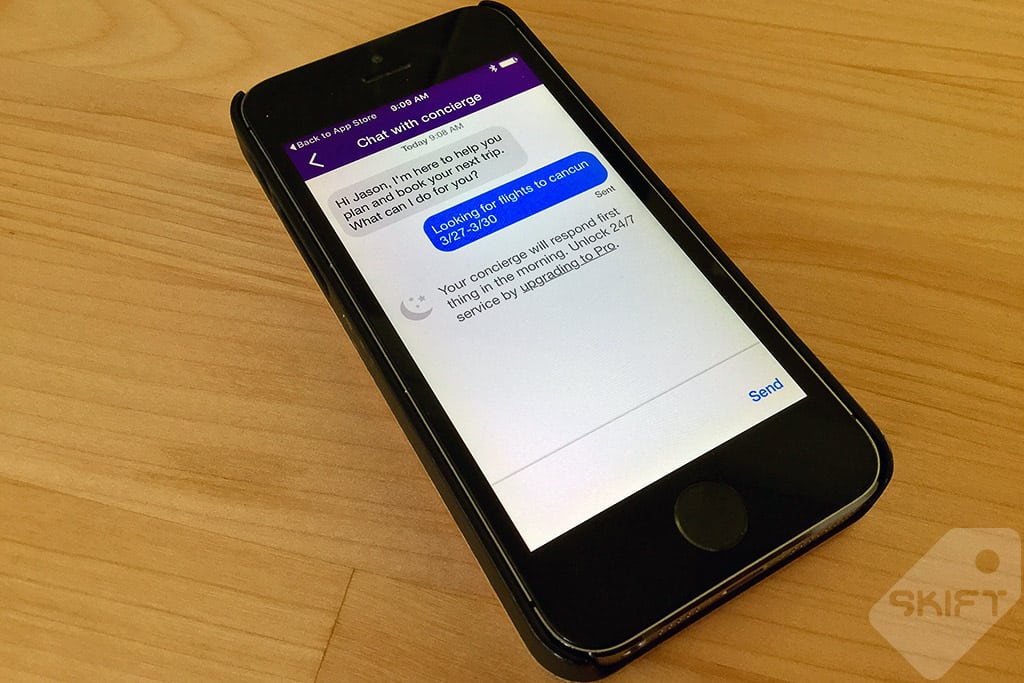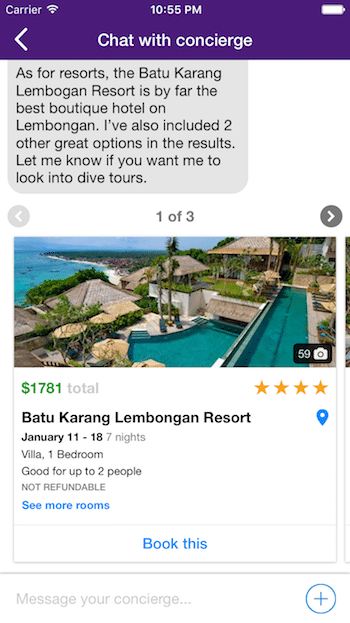Skift Take
In airports and hotel lobbies, how many times have you heard throngs of travelers lamenting: "This app on my phone is wonderful, but if only it had access to real, human travel agents within it?" A new wave of travel startups is conjuring this image. Is it reality-based or wishful thinking? We'll see.
We’ve seen this playbook so many times before in travel startup land.
There’s another travel service, Hyper Travel, that’s launching soon featuring in-app communications with travel agents as well as text and email-based travel booking services.
The impending launch of Hyper, which has some modest seed funding of $410,000 from Greylock Partners, High Line Venture Partners, Metamorphic Ventures and angels such as Drew Patterson of CheckMate, comes immediately after:
- The private beta launch of Lola Travel, Kayak co-founder Paul English’s company, that is readying consumer and travel agent apps that feature heavy intervention of travel agents during the trip-planning process. English says he intends to hire 100 full-time travel agent employees by the end of this year. Lola Travel has some $21 million in funding from Accel Partners and and General Catalyst Partners.
- Kayak’s debut of a text-based travel service, which so far has travelers getting questions answered by Kayak engineers.
- London-based RentalsCombined offers professionally managed vacation rentals through a desktop app that features live chats or phone conversations with travel agents making property recommendations.
- There are numerous companies, including several in Asia, building travel services — some of them for group booking — off Slack, WhatsApp and other messaging services.
Play It Again, Sam
Get ready for dozens of such services to follow with some of the best and most well-funded getting early mover advantage — if indeed they are providing solutions to a problem worth solving.
Brace yourself for numerous angels and venture capital firms to blindly follow the pack, tossing money into questionable, copycat startups that add nothing new after the initial wave.
Whether these travel agent-stocked startups actually fill a substantial void in the market remains to be seen: Messaging apps such as WhatsApp are huge, particularly outside North America, but are there a wide swath of consumers looking for travel agent intervention in their messaging apps or do they want to communicate by text or chat to human travel consultants inside travel apps?
You Got A Problem?
In airports and hotel lobbies, how many times have you heard throngs of travelers lamenting: “This app on my phone is wonderful, but if only it had access to real, human travel agents within it?”
Even if there is an opportunity for travel agent intervention to supplement traditional, do-it-yourself online booking, wouldn’t this evolve as just a new, supplemental service that online travel agencies or travel management companies could tack on as a new customer service option?
In travel, we’ve seen this pattern of early adopters getting funding followed by endless imitators that add nothing different and have no hopes of gaining market share. We aren’t at that stage yet — but rest assured it’s coming.
Historical Playbook
We’ve seen this historical pattern of early adopters followed by countless startup pilers-on in metasearch, user-generated city guides, social travel and travel inspiration sites, for example.
As we referenced in a 2014 Skift Trends Report, Venture Investment Trends in the Travel Industry, PhoCusWright tracked 8,743 digitally oriented travel startups from 2005 to 2013 and found they attracted $4.8 billion in funding from angels, venture capitalists and strategic acquisitions (but excluding acquisitions by public companies and IPOs.)
The travel inspiration sector is a case in point about startups with follow-the-pack mentality.
After the lodging category, the “inspiration” startup sector, including social travel, trip-planning, discovery and guidebooks, was the second-largest category at nearly 200 startups in terms of number of startups created from 2005 to 2013, according to PhoCusWright, although they didn’t attract huge funding. With legions of flameouts, including TravelMuse, NileGuide, Wanderfly, Gtrot, a constantly pivoting Trippy, and many more, travel inspiration startups attracted just more than $1 million in funding on average during the period.
Hyper Travel
Founded in December 2014, Hyper Travel is among the first movers of travel apps with messaging capabilities to travel agents. Co-founded by former Googler Minqi Jiang and Peter Zakin, who most previously worked as a coder and product manager for Venmo, Hyper Travel has an iOS app that touts itself as “a person travel concierge in your pocket.”
The five-employee Hyper Travel currently has three full-time travel agents on the payroll from the San Francisco area who respond to travelers’ inquiries within the app, or via text or email, Minqi says.
It also uses part-timers working out of their homes and a call center during off-hours.
The way it works is that travelers send a message through the app and after some artificial intelligence analysis, it gets routed to the appropriate travel agent.
Pointing to the difficulties that Apple has had with Siri, Minqi concedes that Hyper Travel won’t perfect analysis of “natural language” queries and wants to “use actual, human travel agents to provide” reliable travel services.
The next step for Hyper Travel is to optimize and scale that process, he says.
On the scaleability front, Minqi says “chat is infinitely more scaleable than voice” as the agents might be conducting five chats simultaneously.
Interestingly, co-founders Minqi and Zakin believe services such as Hyper Travel will have applicability to business travel. In fact, their frustration with booking travel in tandem with fellow employees at their at their previous jobs was one of the triggers to launching Hyper Travel.
The Hyper Travel app has been available in iTunes since October, although it hasn’t been publicized. Minqi says Hyper has been providing travel services to several businesses, including a 30-employee media startup and a 2,000-employee law firm.
Hyper Travel currently gets its travel inventory through a variety of sources, including Amadeus, Google and Expedia, and plans on adding new sources.
As with Lola Travel, Hyper Travel is open to new business models beyond getting revenue from transaction fees and subscription services. One of Hyper Travel’s goals is to distribute its service through networks of travel agencies. Side talks with online travel agencies have also taken place, Minqi says.
The bigger players are certainly watching this space — as are legions of would-be startup founders and co-founders, and investors.
The Daily Newsletter
Our daily coverage of the global travel industry. Written by editors and analysts from across Skift’s brands.
Have a confidential tip for Skift? Get in touch
Tags: kayak, lola, slack, whatsapp
Photo credit: A bevy of new travel startups including Hyper, above, want to ensure that travelers' mobile apps are chock full of travel agents ready to chat it up with customers. Skift

